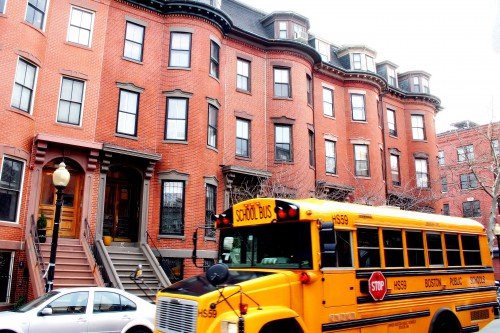On Oct. 8, what seemed like a routine Tuesday school day saw over 30,000 students in Boston were left waiting at bus stops for school buses that never arrived. As alarmed parents and authorities sought quick solutions, such as cops driving kids to class, the city was shocked to find that upset bus drivers did not go into work that day to protest what they judged as violations against their contracts.
The event caused much morning chaos as police rushed to help as much children as they could, as well as find areas to keep them safe. Parents were also put into predicaments and forced to make last minute daycare and transportation plans, in some cases even calling in to work after finding no alternative.
According to the New York Times, the protest was due to the latest changes that Veolia, the city’s transportation partner, has recently implemented.
The changes involve check in and out procedures that take more time than the bus drivers have been accustomed to since they could not take the keys of the buses home any longer. The updates also include installing GPS systems which give both Veolia and parents access to the location of any bus while in transit. Similar devices will be mandatory in New York City in 2014.
Bus drivers reportedly “did not object to parents following the buses but, they said, to the company’s using the system to map new routes that drivers said led to overcrowding and delays. On their Web site, drivers called the GPS units ‘spy devices’.”

Their grievances alone were not the only triggers to their protest. Bus drivers were ready to speak to the National Labor Relations Board to address all issues. Amid the government shutdown, however, the board is not scheduled to meet, angering the drivers and fueling them to the event that occurred on Oct. 8. They felt their voices were being ignored and their rights violated.
The Boston Globe reports that the mayor’s administration is investigating the issue, as well as highlighting that the organizers of the strike abused their knowledge of the lack of information many bus drivers have over policies in the U.S., since many are immigrants and unaware of these laws.
Although the protest disrupted a single morning, the drivers who pushed for the strike largely underestimated or ignored the effects their actions would have on the community. The students that rely on these buses range from toddlers to teenagers that are able to care for themselves, but what about the small students who were left waiting for their usual bus to come? For their safety, they cannot be left alone for periods of time larger than they are used to, as they are too young to make a decision that may not put their life in danger.
If the protest lies on the issues that have been published, it seems the bus drivers were not fighting for “unfair” changes, but just the change itself, refusing to train into an updated system unfamiliar to them. Their acts got them under the spotlight, but at the expense of thousands of people who were in no part actors in their grievances.








